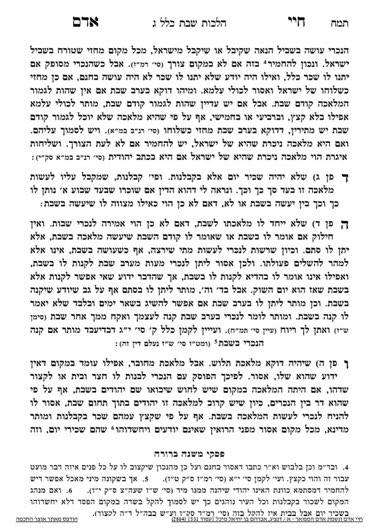We are continuing in siman 6, where the Chayei Adam discusses the fifth criterion for it to be permitted to make an arrangement with a non-Jew before Shabbos regarding melacha on Shabbos. The Chayei Adam writes that the item which the non-Jew will be working on must be talush, detached from the ground. If the item is mechubar, attached to the ground, whether agricultural or construction, it is assur. The Chayei Adam writes that even if the ground where the work is taking place is not known to belong to a Jew, it is still assur.
The Chayei Adam writes that even if a Jew hires a non-Jew with a kablan arrangement, and they set a price beforehand (i.e., all other criteria are met), it is still assur because of maris ayin. As we learned yesterday, maris ayin is only between Jews. Therefore, the Chayei Adam writes that if the field or construction site is within the techum of other Jews, it is a problem. The maris ayin is that other Jews will see the non-Jew working, and think that the non-Jew was hired as a sechir yom rather than as a kablan (see shiur S0076)..
This is the issur of maris ayin we discussed yesterday. However, unlike most issurim of maris ayin, since the entire issur over here is because the work is being done in public, if it is done in private, it is muttar. This is an exception to the general institution of maris ayin issurim, which are assur in all situations, as we learned yesterday. Therefore, there is a difference between when the item is mechubar, and therefore public, and talush, where it can be done in private, as the Chayei Adam wrote above.
The Chayei Adam wrote that the issue is that people will assume the non-Jew was hired as a sechir yom. The Mishnah Berurah writes that if the minhag in that city is that the arrangement for that particular type of work is always to be done as a kablan, it would be muttar for agricultural purposes, in a situation of a monetary loss. However, we are never lenient regarding construction. We will discuss the difference in the next shiur, be’ezras Hashem.
Summary
- If one instructs a non-Jew before Shabbos, there are times when it will be muttar, depending on eight conditions.
- The fifth condition is that the item not be attached to the ground, due to a concern of maris ayin.
- However, if the maris ayin is not relevant, such as there are no Jews around, or the Jews around have no reason to suspect anything assur, it is not a problem. Therefore, if the minhag in that city is that the arrangement for that particular type of work is always to be done as a kablan, it would be muttar for agricultural purposes, in a situation of a monetary loss.



